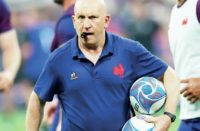 England's attack has been a hot topic this week after an autumn of few tries against the better teams. This is understandable, especially as there's also been talk from within the England squad about climbing higher in the IRB rankings. The reality check on that ambition is that there's little hope of achieving it without scoring tries.
England's attack has been a hot topic this week after an autumn of few tries against the better teams. This is understandable, especially as there's also been talk from within the England squad about climbing higher in the IRB rankings. The reality check on that ambition is that there's little hope of achieving it without scoring tries.
England were dominant in possession and with territory in both halves but never looked like scoring enough tries to worry New Zealand.
New Zealand scored 24 tries in this season's Rugby Championship – twice as many as Australia, playing against the same teams – while South Africa scored 23. Compare that with England's five tries in last season's Six Nations, or the seven they scored the year before, or even Wales, who scored a huge nine tries in becoming 2013 Six Nations champions!
The weather can have an effect on the way a team plays, but attitude is the main factor. To play attacking rugby the whole team must have the right mind-set, and I don't think England have it in all quarters yet.
The England management and players talk a good game, but don't produce enough of what they preach. No matter what the weather conditions, if you haven't the mind-set to score tries there will not be any ambition to succeed in that area. You have to nail your colours to the mast.
South Africa have made the jump in attack. While still having traditional forward power they have recognised the need to score not just through their big pack, but by the skill, speed and accuracy of their backs.
To attack well as a team you need to produce quick ball that leaves the defence disorganised and going backwards. Your players need to be rugby smart, and have vision, skill, and be good communicators who support each other. They must have instinct and commitment – and be able to make a decision and execute accurately to make the best use of quick ball.
I would not be happy playing in this England backline. When it moves the ball the alignment is invariably too flat off a 10 standing deep. This means that most of the moves they attempt – and there aren't many – take place too far behind the gain-line, with runners crabbing across field. You're fighting a losing battle in those situations.
If I've said it once, I've said it a thousand times: When Owen Farrell has the ball he has to be much closer to the gain-line. The reason he doesn't do that at the moment must be because he finds it uncomfortable – and that could be because players outside him aren't calling for the ball or the move.
To attack, the fly-half must be flat when he gets the ball, and running straight. A move might be pre-called, but, if it isn't, there are moves you can still call before the ball reaches the 10. So long as he hears, everything is on.
If there's no move called, the 10 still receives the ball flat and runs straight, but he has to listen to those outside him calling ‘long, deep, long flat, short deep, etc'.
This sort of calling should be common practice, and you should be able to pass almost blind-folded – but I'm not convinced it is. A lot of teams have certain calls which have a few phases of set play, but it's pretty proscriptive and few players take the risk of going outside those sets.
Some teams, England among them, have been criticised for making clean breaks in games but with no support runners in close proximity to continue the play. It's amazing how often players around that break aren't expecting it – and the reason they haven't anticipated a break is because it wasn't part of a set play.
I've watched England on too many occasions pass one-out from the breakdown, allowing a defence with good line-speed to hit them behind the gain-line. They also have a propensity to keep the ball at the back of the ruck, with the scrum-half directing the forwards to line up a few yards away from him and then passing them the ball. That's not smart rugby in my book.
Why can't the players anticipate that situation and align themselves deeper? This enables them to time their run and think about making another pass to a player outside them who is in more space and running quicker.
Having that kind of vision and anticipation is what sets the All Blacks apart. The example would be Kieran Read's try when he took a pass from Dan Carter and moved it on to Owen Franks. The prop had seen the same space Read had seen, and ran into it – and probably also called for the pass. That's the difference, that's smart rugby.
In England we've become too reliant on defence and not worked hard enough on attack, and I'm confounded by it. Coaches seem to be obsessed with achieving a certain field position to attack from, and it ends up with teams going through phases, racking up so many meters and carries with the ball, but achieving so few line-breaks and tries.
The big mistake is that in trying to get to the Holy Grail attacking position mapped out by their coaches, players don't see overlaps and miss-matches – and, on too many occasions they don't get there anyway, because of unforced errors.
Defence is straightforward. Learn the technique to tackle safely and you should be comfortable. Attack isn't that structured. It's about seeing, taking, and finishing the opportunity.
If you don't have the technique to pass accurately then attack is nigh on impossible – and I would gamble that in a lot of training sessions around the pro clubs the passing accuracy is not of a very high standard. Yet, for some reason that's acceptable.
How can any team expect to attack well if you can't get the ball down the line quickly and in front of the player running onto it? I wonder how many teams actually practise that? At international level passing accurately should be part of a player's skill set, yet how many bad passes behind a player do we see?
How many overlaps do we see squandered because players cannot run straight at a defender, draw the defender, and pass to save space for the players outside to use better? And how many times do we see a player throw a long pass, allowing the defence to drift and squeeze the receiver, and the overlap has been lost?
I don't understand why these skills aren't practised enough to make them a habit, just like tackling is.
There are lots of opportunities to attack in a game, and the All Blacks have even made an art of having an attacking defence. The amount of tries they score from turnovers is amazing – although it's not amazing to them because they practise it, and expect to score in those situations because they back their skill and decision-making.
Which brings us back to how the All Blacks exploited the Franks break against England. It stemmed from what Israel Dagg saw from the breakdown.
If Dagg had not spotted space and a miss-match down the blindside the play could have continued going away from him, but he called to Aaron Smith. This led to the New Zealand scrum-half passing to Dagg as he ran at the space between two England players. Read had anticipated Dagg's move and ran a great line of support, taking the ball at pace to score. Brilliant but simple.
Attack isn't rocket science, but it is an understanding of what to do in given situations, and making the right decisions.

























